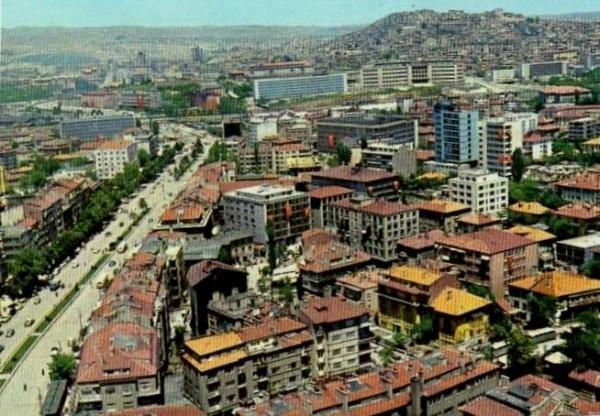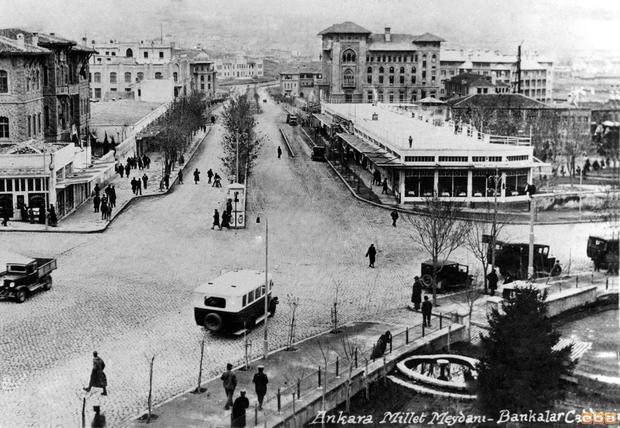Ankara, seen through artists’ eyes
Emrah Güler - ANKARA
 The Turkish capital of Ankara was the center of headlines when two explosions hit a peace rally at the city’s main train station Saturday [Oct. 10], a terror act with one of the biggest fatalities in history. The sad news came just days before its anniversary of becoming the capital of a newly-founded Turkish Republic on Oct. 13, 1923.
The Turkish capital of Ankara was the center of headlines when two explosions hit a peace rally at the city’s main train station Saturday [Oct. 10], a terror act with one of the biggest fatalities in history. The sad news came just days before its anniversary of becoming the capital of a newly-founded Turkish Republic on Oct. 13, 1923.Unlike many of capital cities across the world, Ankara is hardly an inspirational city. That is, in the traditional sense of the word. There is no adjacent seaside, neither a river passing through that would negate its bleak atmosphere. The green dominating some parts of the city are a couple of decades old in an otherwise typical landscape of the Anatolian steppes.
The name that has stuck with Ankara for decades is “the city of bureaucrats,” a reference to the range of government buildings that take over the city and the occasional halt of traffic for the cortege of a high-level government official. Now, with the booming construction business across the country, dozens of high rises take their place next to government buildings.

Despite its obscene growth in the last couple of decades, Ankara continues to be a slow city, giving the occasional feeling that time is somehow suspended. Those who have lived in the capital city, and those who still do, know a different Ankara. For them, it is a city that pushes you to talk with one another, a city that inspires with its peaceful routine and a city that encourages you to be in closed spaces and then go out again on a spur.
This is the Ankara that has inspired writers for nearly a century to set the city as its background, the ideal setting to accompany human stories. One of the oldest novels to take place in Ankara is the turn-of-the-century novelist and diplomat Yakup Kadri Karaosmanoğlu’s lesser known work, titled simply “Ankara” of 1934. The novel explores Turkey’s foray into modernity through its female protagonist Selma Hanım in three parts, the Independence War leading to the foundation of modern Turkey, the first years and subsequently the first decades of the republic.
Noontime in the ‘60s, despair in nights
The 1973 novel of the late female novelist Sevgi Soysal and the recipient of the Orhan Kemal Award, “Yenişehir’de Bir Öğle Vakti” (Noontime in Yenişehir) is another classic novel set in Ankara. The novel is a vivid portrait of 1960s Turkey and Ankara, told through the intertwining lives of three people. Many remember the novel with the scene in the beginning and the end, when a poplar tree in downtown Ankara collapses.
For a heartfelt and romantic glimpse into Ankara, Barış Bıçakçı’s modern classic of 2004, “Bizim Büyük Çaresizliğimiz” (Our Grand Despair), as well as the 2011 movie adaptation by the late director Seyfi Teoman, is recommended. The novel tells the story of two 30-something men, childhood friends and roommates, and how their relationship is disrupted by a woman coming into their lives and their home, all the while Ankara hovers throughout, taking center stage in the story.

The Ankara and the people of Ankara we see in “Bizim Büyük Çaresizliğimiz” is an uncannily familiar place to those who have lived in the city. As the unique relationship between the two friends, and with their new roommate, alternates between tension and peace, and back to tension again, Ankara takes on a major role.
The city allows them spaces for breathing, pondering over the nuances of a rollercoaster relationship, and recovering, with the film becoming an ode to the city in its most familiar.
These three novels portray the capital city in different periods spread over a century. Ankara as a place of inspiration is not limited to writers, as the city has taken over musicians as well. Take the alternative rock band Vega’s song “Ankara,” for instance: “When the rain turns into snow / Songs will take my future / All for you, all for you / In Ankara, tonight.”
In another song, titled simply “Ankara” as well, rock singer Haluk Levent sings: “You are not here / I’m alone in this beach / Whatever you’re doing / Without me in Ankara.” The veteran singer Alpay also croons for love lost in Ankara in his “Ankara Garında” (At the Ankara Train Station): “Without a single drop of alcohol / I was drunk that night / I was at the Ankara train station / You, at the window of a train.” Perhaps the times ask us to remember Ankara from artists’ eyes.
















